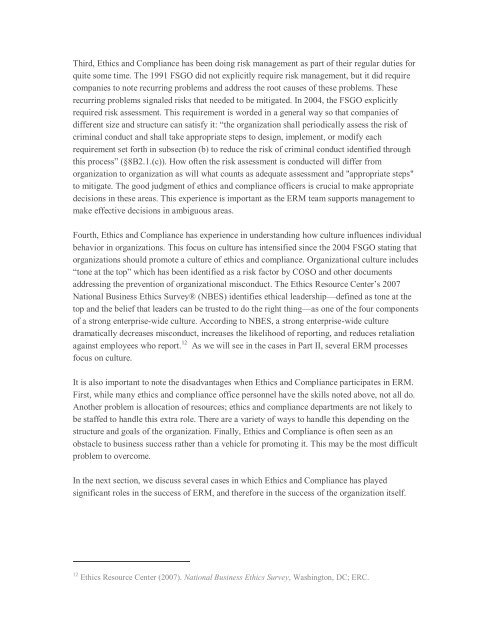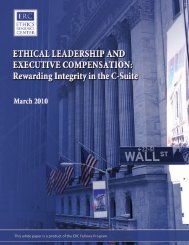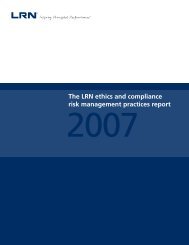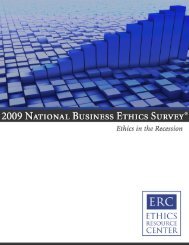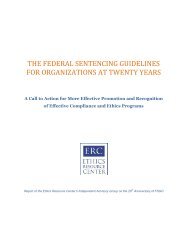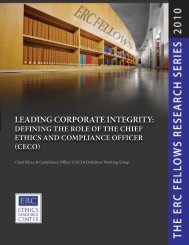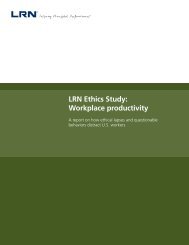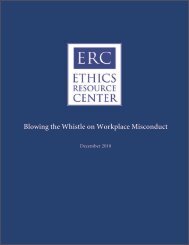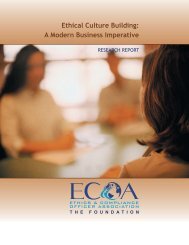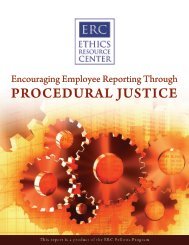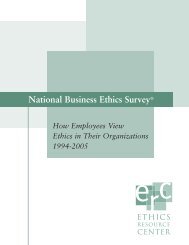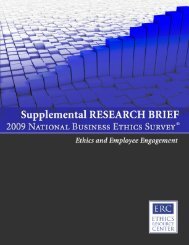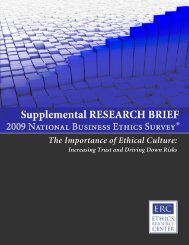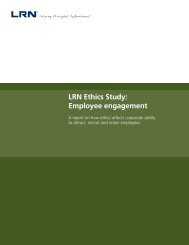enterprise risk management: why the ethics and compliance function ...
enterprise risk management: why the ethics and compliance function ...
enterprise risk management: why the ethics and compliance function ...
Create successful ePaper yourself
Turn your PDF publications into a flip-book with our unique Google optimized e-Paper software.
Third, Ethics <strong>and</strong> Compliance has been doing <strong>risk</strong> <strong>management</strong> as part of <strong>the</strong>ir regular duties for<br />
quite some time. The 1991 FSGO did not explicitly require <strong>risk</strong> <strong>management</strong>, but it did require<br />
companies to note recurring problems <strong>and</strong> address <strong>the</strong> root causes of <strong>the</strong>se problems. These<br />
recurring problems signaled <strong>risk</strong>s that needed to be mitigated. In 2004, <strong>the</strong> FSGO explicitly<br />
required <strong>risk</strong> assessment. This requirement is worded in a general way so that companies of<br />
different size <strong>and</strong> structure can satisfy it: ―<strong>the</strong> organization shall periodically assess <strong>the</strong> <strong>risk</strong> of<br />
criminal conduct <strong>and</strong> shall take appropriate steps to design, implement, or modify each<br />
requirement set forth in subsection (b) to reduce <strong>the</strong> <strong>risk</strong> of criminal conduct identified through<br />
this process‖ (§8B2.1.(c)). How often <strong>the</strong> <strong>risk</strong> assessment is conducted will differ from<br />
organization to organization as will what counts as adequate assessment <strong>and</strong> "appropriate steps"<br />
to mitigate. The good judgment of <strong>ethics</strong> <strong>and</strong> <strong>compliance</strong> officers is crucial to make appropriate<br />
decisions in <strong>the</strong>se areas. This experience is important as <strong>the</strong> ERM team supports <strong>management</strong> to<br />
make effective decisions in ambiguous areas.<br />
Fourth, Ethics <strong>and</strong> Compliance has experience in underst<strong>and</strong>ing how culture influences individual<br />
behavior in organizations. This focus on culture has intensified since <strong>the</strong> 2004 FSGO stating that<br />
organizations should promote a culture of <strong>ethics</strong> <strong>and</strong> <strong>compliance</strong>. Organizational culture includes<br />
―tone at <strong>the</strong> top‖ which has been identified as a <strong>risk</strong> factor by COSO <strong>and</strong> o<strong>the</strong>r documents<br />
addressing <strong>the</strong> prevention of organizational misconduct. The Ethics Resource Center’s 2007<br />
National Business Ethics Survey® (NBES) identifies ethical leadership—defined as tone at <strong>the</strong><br />
top <strong>and</strong> <strong>the</strong> belief that leaders can be trusted to do <strong>the</strong> right thing—as one of <strong>the</strong> four components<br />
of a strong <strong>enterprise</strong>-wide culture. According to NBES, a strong <strong>enterprise</strong>-wide culture<br />
dramatically decreases misconduct, increases <strong>the</strong> likelihood of reporting, <strong>and</strong> reduces retaliation<br />
against employees who report. 12 As we will see in <strong>the</strong> cases in Part II, several ERM processes<br />
focus on culture.<br />
It is also important to note <strong>the</strong> disadvantages when Ethics <strong>and</strong> Compliance participates in ERM.<br />
First, while many <strong>ethics</strong> <strong>and</strong> <strong>compliance</strong> office personnel have <strong>the</strong> skills noted above, not all do.<br />
Ano<strong>the</strong>r problem is allocation of resources; <strong>ethics</strong> <strong>and</strong> <strong>compliance</strong> departments are not likely to<br />
be staffed to h<strong>and</strong>le this extra role. There are a variety of ways to h<strong>and</strong>le this depending on <strong>the</strong><br />
structure <strong>and</strong> goals of <strong>the</strong> organization. Finally, Ethics <strong>and</strong> Compliance is often seen as an<br />
obstacle to business success ra<strong>the</strong>r than a vehicle for promoting it. This may be <strong>the</strong> most difficult<br />
problem to overcome.<br />
In <strong>the</strong> next section, we discuss several cases in which Ethics <strong>and</strong> Compliance has played<br />
significant roles in <strong>the</strong> success of ERM, <strong>and</strong> <strong>the</strong>refore in <strong>the</strong> success of <strong>the</strong> organization itself.<br />
12 Ethics Resource Center (2007). National Business Ethics Survey, Washington, DC; ERC.


